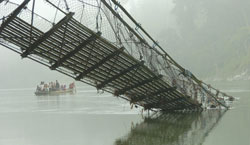|
|
| WAR WOUNDS: This bridge across the Bheri in Surkhet was destroyed by the Maoists three years ago. |
The 10th five-year plan ends in June this year. The interim government is working towards an 'interim plan', rather than the 11th plan. "The interim plan is because Nepal's transition phase will present new challenges," says Jagdish Chandra Pokhrel, vice chairman of the National Planning Commission.
The interim plan will follow the guidelines set by the five-year plans, which means there will be no changes in methods of spending, monitoring, and other basic procedures. We are told that the plan will be geographically inclusive, and will focus on reconciliation, reconstruction of infrastructure and society. This is the first time since five-year planning was started half-a-century ago that the country has not had one.
The government plans to invest in infrastructure to generate employment opportunities, pump cash into the economy, and spur the market. The plan will focus on areas like agriculture and tourism to increase investment, paying extra attention to roads, irrigation, electricity, drinking water, education, and health services.
"The private sector is still reluctant to invest, which is why we have the state investing," explains Pokhrel. "Hopefully this will create a favourable environment for the private sector to also invest soon."
Investment in roads, microhydro, and drinking water schemes is to increase by 50-60 percent. A fast track highway linking Kathmandu to the tarai and roads to district headquarters are to be prioritised, as are irrigation programs.
Commission officers say it will take more time to quantify investment in education, health, and other social sectors, because it is proving difficult to evaluate how much damage the ten years of war has done to these sectors. The investment target of the Rs 500 billion interim plan is Rs 170 billion, and takes into consideration the inflation, which is at six percent and purchasing power, which is estimated to increase by 15 percent this year.
Implementation will, as always, be a challenge. Nine months into this fiscal year, only 15 percent of the VDCs' local development budget has been spent, though it was ambitiously doubled to Rs 1 million per VDC last year.
Planning Commission sources tell us that some donors, including the US, indicate that their continued assistance to Nepal will depend on how the Maoists conduct themselves in the coming months. Other donor countries, including the UK, Denmark, and Switzerland have resumed or announced new aid packages after the Maoists joined the interim government less than two weeks ago.
The World Bank, which provides aid that is not program-specific-that is, the government can spend it as it needs to-is already discussing conditional support. It has changed its country strategy to 'interim strategy note', echoing the government's interim economic plan. The note says that Nepal's period of transition will be evaluated as easy, interrupted by deadlocks, and deteriorating. Aid for an \'easy\' environment will be $200 million for the period of transition, going to $100 millionfor a deadlocked process, and nothing if the situation deteriorates.
The Bank is asking the government to focus on roads, and big irrigation and hydropower projects.
Distinct from the interim economic plan is the Nepal Peace Trust Fund, emergency aid provided by the international community. The government says the fund, which is under the aegis of the new Ministry of Peace and Reconstruction and other institutions monitoring the peace accord, is t be directed towards rehabilitation of the displaced and Maoist fighters, reconstruction of infrastructure, constituent assembly elections, law and order support, and maintenance of the Maoist cantonments. The fund is empowered to dispense money as it sees fit without going through the longer normal approval process.
Financial analysts say that the Rs 7 billion planned for the three-year fund has been underestimated by as much as 100 percent. The interim government has signed a separate joint financial agreement with the UK and Norway for assistance to the peace fund.
The dates of the all-important Nepal Development Forum, where appeals for aid will be evaluated, will only be announced after the dates of the constituent assembly election.
Meantime, the UN is proposing a Nepal Trust Fund similar to the interim government's peace trust fund. The UN says the fund is to support UNMIN and the peace process in general. Finance Ministry sources argue that there is a conflict of interest here, and the Nepal Peace Trust Fund can aid UNMIN if it requires more funds.



